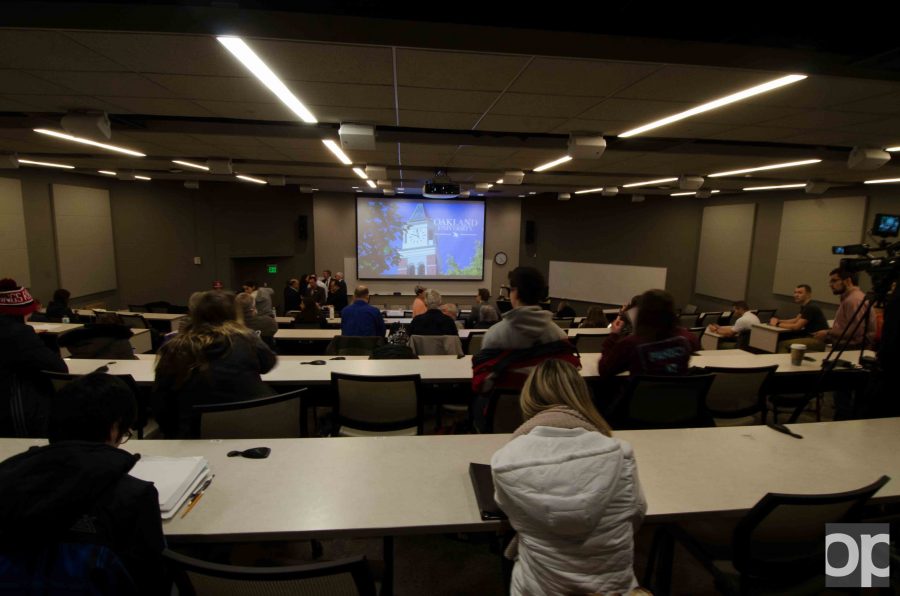Physician-assisted suicide panel provokes criticism and praise from OU community
Panelists debated the proposed Michigan Death with Dignity Act.
Soon after the 20th anniversary of OU student Roosevelt Dawson’s death, which took place through the assistance of Dr. Jack Kevorkian, panelists discussed the pros and cons of physician-assisted suicide.
A bill that would allow physician-assisted suicide may be considered by the Michigan Legislature.
The proposed law, or Michigan Death With Dignity Act, would allow patients to request what’s known as “life-ending” medical care after it has been determined that they are of sound mind for requesting the procedure and that their current condition is terminal – allowing the patient less than six months to live.
Just as patients would be free to choose whether they undergo this form of care, physicians would be free to choose whether they provide it.
Panelists of the Monday, March 13 discussion centered the debate around the purpose of the medical industry. Some proponents of the legislation asserted that the purpose of health care has shifted from solely a life-prolonging service to being more focused on the patient’s well-being, with physician-assisted suicide adhering more closely to the latter purpose.
Much of the criticism over the bill was addressed throughout the panel, with one panelist fearing that insurance companies would manipulate the new procedure in order to save costs for treatment. The same panelist also underscored the already-flawed treatment of the elderly by American culture and made the assertion that physician-assisted suicide could take the form of elder abuse in some instances.
The main reason stated for providing this choice to patients was based on dignity and autonomy. Patients would be granted this choice to maintain a form of dignity and control in their lives before they lose control over their bodily functions often taken by terminal illnesses.
However, there may not be a future for this bill.
“As for the makeup of the House, they’re more conservative than they were last session, so I’m not real optimistic that I’ll even get a hearing,” said State Representative and co-sponsor of the bill Tom Cochran.
Some people in the bioethical community see this issue as one that will continue to raise ethical questions about the current purpose of medicine.
“All of these issues are going to continue to rear their heads because what we see in medicine is that it’s going to continue to extend life,” said Justin Wasserman, panelist and associate professor of Biomedical Sciences. “And it’s going to continue to evolve that capacity, and at some point we’re going to have to confront the question of ‘Should we continue to do that?’”
The focus of the panel was addressing criticisms and allowing the community, both on- and off-campus, to express its concerns and qualms to experts on topics like this from the fields of bioethics and religion, as well as co-sponsor Cochran.
“The whole point of this is just to have the conversation, to make Oakland a place where difficult issues can be discussed in a civil and respectful way, which is something that doesn’t happen a whole lot these days.” said David Dulio, professor and chair of the Political Science Department, which hosted the panel.
The panelists included Cochran, Assistant Director of the Patients’ Rights Council Jason Negri, faculty members of OU William Beaumont School of Medicine Amy DeBaets and Jason Wasserman, and Director of Christianity Studies Charles Mabee.






Bradley Williams • Mar 16, 2017 at 6:10 PM
All is not well where assisted suicide is legal. There is documented abuse see Thomas Middleton Fed case where he was killed via the OR policy for his assets.
I was my wife’s 24/7 caregiver during her last 18 months of declining autonomy.
Pitfalls in assisted suicide laws need attention. We already have the right to refuse treatment. Many who believe in the concept under the choice banner have second-thoughts.org when they read the language of the actual bill and realize our choice is Ignored and certainly not assured.
This is not about people who are dying anyway.
Amending Colorado’s Prop 106 is sorely needed (and OR,WA,CA). The initiative a monopoly and profit center was bought for $8,000,000 of deception. Even as they proclaimed that the poison must be self administered they did not provide for an ordinary witness. The difference is that without a witness it allows forced euthanasia but with a witness they would up hold individual choice.
Amendments would include requiring a witness to the self administration, restore the illegality of falsifying the death certificate require the posting of the poison applied in the medical record for the sake of good stewardship for future studies, register organ/tissue trafficking, reveal commissions and memorials paid to the corporate facilitators and keep all records for transparent public safety policy.
These Oregon model bills do not assure our choice and ignore our choice by empowering predatory corporations over us.
Bradley Williams
President
MTaas org